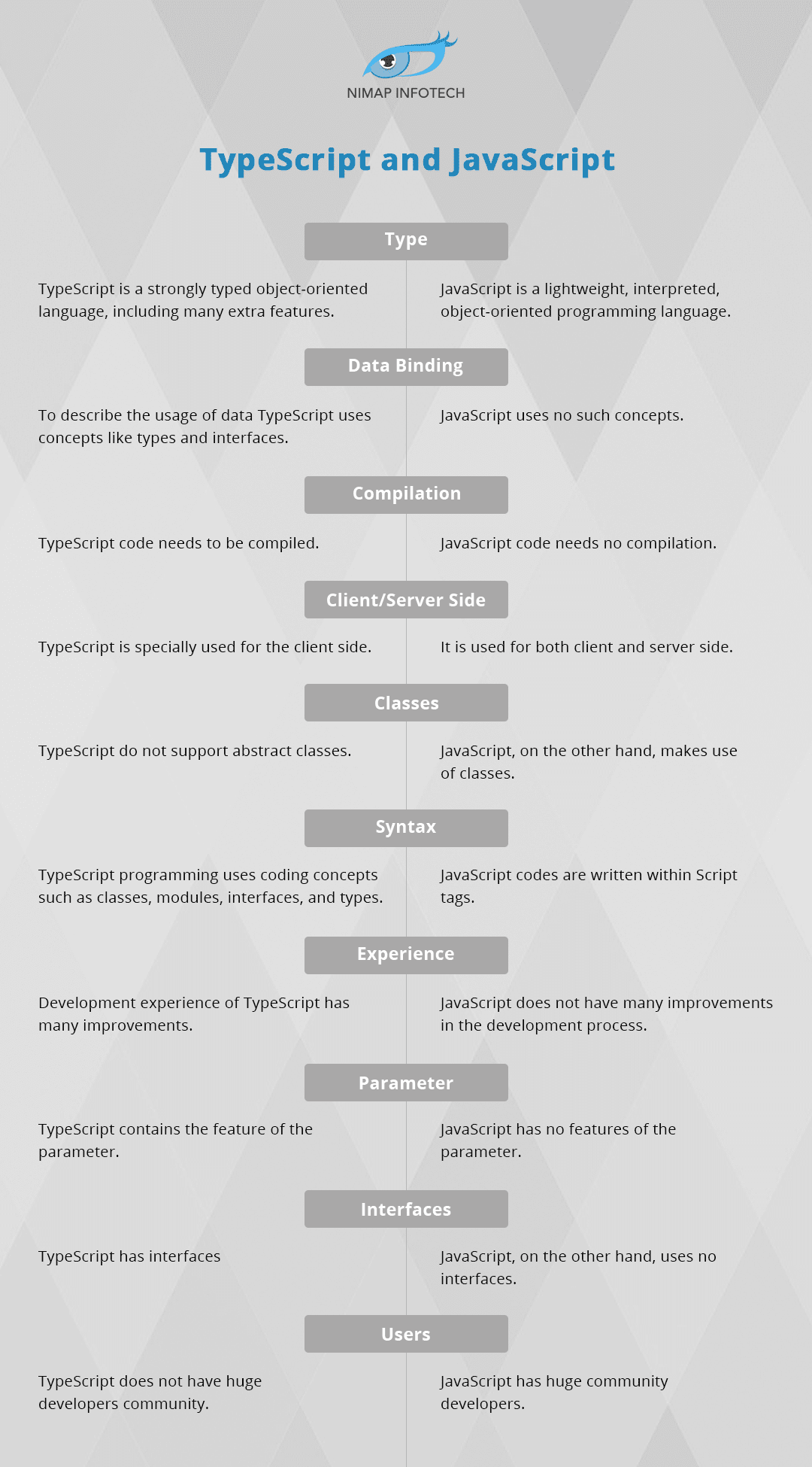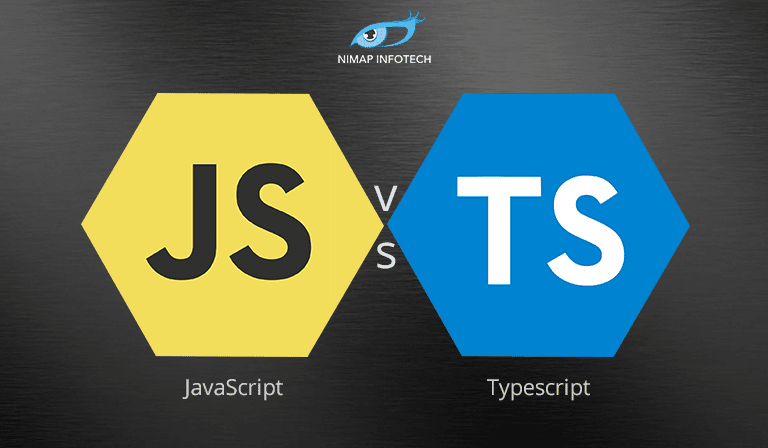In this blog, we’ll take a closer look at the differences between JavaScript and TypeScript, including their syntax, features, and use cases. By the end, you should have a better understanding of which language is best suited for your project.
Table of Contents
ToggleJavaScript
JavaScript is a high-level scripting and programming language. Commonly got popularized for making your websites alive and interacting. Helping you make dynamic web pages it allows client-side scripts or programming to interact with the users.
JavaScript was first invented and introduced as LiveScript in 1995. However, Netscape changed its name to JavaScript. The general purpose of the language is been embedded in Netscape, Internet Explorer, and other web browsers. This web language after years of improvement has widely become popular for making your web pages alive.
Light in weight with object-oriented skills, JavaScripts can give motion to your web pages. Rather than creating just a static page you can add and display various current updates, interactive maps, 2D or 3D objects, videos, and many more other things. Thus, now if you encounter any such non-ideal web page you can easily identify it as JavaScript page.
Programming in JavaScript is mainly known as scripts. Provided and executed as plain text, it does not need any compilation for running any program. Thus, in other words, you can simply know JavaScript is different from other languages called Java.
TypeScript
TypeScript, designed and developed by Anders Hejlsberg is a strongly typed, object-oriented, compiled language. It is a type of superset of JavaScript primarily used for providing optional static typing, classes, and interfaces.
Being an open-source programming language maintained by Microsoft, TypeScript helps you in the development of large applications. It helps you develop JavaScript applications for both the client-side and server-side execution. Another big advantage provided by TypeScript is that while you type the code by enabling the IDEs it provides you a richer environment for spotting common errors.
Benefits of JavaScript
Speed- JavaScript does not require any need to be compiled on client-side. Hence, it offers great speed advantages to the developers. Due to its great speed, it immediately runs on the client-side browsers.
Popularity- JavaScript has a huge active community of developers which makes it easier to find people who develop projects. JavaScript running everywhere on the web has numerous resources present.
Easy to Learn- JavaScript codes syntax is easy to learn and understand. Using the DOM Model, JavaScript provides plenty of predefined functionalities to objects on pages.
Flexibility- JavaScript offers its developers great flexibility features. Using JavaScript developers can create their own JavaScript app on front-end.
No Compilation- JavaScript does not require any need of compilation process. Using its HTML tags browser can interpret JavaScript.
Simplicity- JavaScript is easy to learn, understand, and implement.
Hire Javascript Developer
Also Read: Advantages and Disadvantages of Javascript
Benefits of TypeScript
Static Typing – TypeScript provides its users with a major benefit of using optional Static typing. Using this, developers are allowed to add functions, variables, properties, objects and can play with their codes in various ways. Also, static typing provides its users with a great deal of detecting and rectifying bugs. Using the latest tools within seconds they can detect the bugs and clear them, no matter how big your app is. Thus, providing great stability in your work TypeScript provides you easy support and maintenance.
Saves Time- As a developer, it provides your talent and knowledge of work extra capabilities. Easy debugging with no silly errors make your work done in less time. Thus, saving your time and efforts it makes your job easier.
Browser Compatibility- TypeScript transforms its code and makes the compilation process very smooth. Spilling out the ES5-compliant process modern browsers can add great flavors in their work. It makes its users forget all other problems.
Productivity- Features such as easy debugging, auto-compilation, code scalability, and Interface oriented development, etc helps its developers boost their productivity.
Differences Between: Javascript vs Typescript

Read More: Java vs JavaScript: What’s the Difference?
Javascript Features
Asynchronous programming: JavaScript includes support for asynchronous programming. Allowing it to manage numerous tasks at the same time.
Object-oriented programming: The features such as encapsulation, inheritance, and polymorphism are supported by JavaScript.
Dynamic Typing: Variables in JavaScript do not have a fixed type, and the variable type can change throughout program execution.
Event-driven programming: JavaScript is frequently used in event-driven programming. Which occurs when an event occurs, such as a user hitting a button or a website loading.
Built-in Support: For regular expressions are integrated into JavaScript. Regular expressions are used to match patterns in strings.
Cross-Platform Support: JavaScript is supported by all current web browsers and may be executed on a wide range of platforms, including desktop and mobile devices.
Typescript Features
As part of type annotations: TypeScript allows variables, functions, and other constructs to be associated with type annotations, and it enables static type checking.
Module: With TypeScript, developers can use modules to organize their code into logical units. Modules can also be imported and exported between modules.
Error handling is improved: TypeScript can catch errors that JavaScript missed until runtime—improving the robustness and reliability of the code.
Improved Refactoring and Code Completion: With TypeScript’s static typing and other language features.
Interfaces: TypeScript allows developers to define interfaces that determine an object’s structure, methods, and properties.
Object-oriented programming with classes: TypeScript has a class-based code model similar to Java and C#.
Which is Better- Javascript vs Typescript?
Based on the above-discussed differences, we can conclude that both TypeScript and JavaScript has its own benefits and limitations. JavaScript is a dynamic language, especially used for enhancing HTML Pages. However, is not a fully fledged programming hence, for coding small coding projects it is more preferable to use JavaScript.
TypeScript is an object-oriented language, makes your code clean, simple, and reusable. Therefore, for developing large projects it is more feasible to use TypeScript. Providing extra features it is getting more and more popularity with every new project release.
Recommended Reading: JavaScript frameworks
If you find this blog about Javascript vs Typescript useful, do check out our other IT development blogs. However, if you do not have much experience with programming languages like JavaScript and TypeScript you can consult our developers at Nimap Infotech. You can also hire our web developers on a project basis for designing or improving your projects. The web development team at Nimap Infotech is always ready to help their clients.
Author
-

A technology enthusiast with over 14+ years of hands-on experience in the IT industry, I specialize in developing SaaS applications using Microsoft Technologies and the PEAN stack. I lead a team of 300+ engineers, holding multiple Microsoft certifications (MCSD, MCTS, MCPS, MCPD). My expertise spans across C#, ASP.NET, NodeJS, SQL Server, and Postgres.
View all posts









